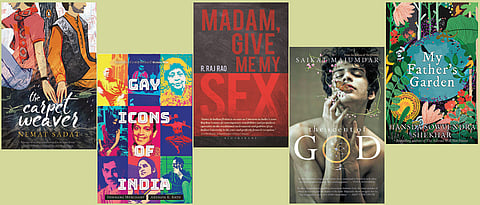

After the law criminalising same-sex acts — Section 377 of the IPC — was repealed again in September 2018, you would think publishers would now be more open to bringing out queer content for mainstream readers. However, if you do a quick survey of books published in English in 2019, you’d know, this is not the case. To be honest, we have a sizeable number of titles with decidedly queer themes published in 2019, but none of them managed to attract the cultural zeitgeist.
Two of the well-reviewed books with gay themes published this year were Saikat Majumdar’s The Scent of God and Hansda Sowvendra Shekhar’s My Father’s Garden (released late 2019). But I am loath to include them in a list of queer literature, because in both the novels, the same-sex narrative is incidental to the overarching themes the authors are trying to portray.
Shekhar’s My Father’s Garden is a study in masculinity, divided in three sections — lover, friend and father. The first section narrates a same-sex love affair in a college hostel, which is coloured by the lover’s heteronormative attitudes towards homosexuality. He doesn’t mind the sex act, but refuses to give the narrator the validity of his desire. Ultimately, the story ends in predictable tragedy with the narrator realising that his love was a compromise, and a sorry one.
The Scent of God is much more complicated in the context of gay writing from India, where Majumdar explores same-sex desire within the confines of a religious setting. Again, the narrative underscores the heteronormative attitude towards same-sex desire: you can fulfil your desires as long as you don’t talk about it. You can be a homosexual, but not gay. Post the SC verdict on Section 377, you’d expect same-sex desires to find a meaningful conclusion in Indian writing in English, but beneath the veneer of beautifully realised prose, targeted at a heterosexual audience, the attitude towards homosexuality remains the same.
So it’s no surprise that the best queer book published in India in 2019 was a novel by an Afghan-American author, Nemat Sadat. In The Carpet Weaver, Sadat tells an honest and harrowing coming-of-age story of being gay and proud. In a novel coloured by nostalgia and trauma — of pre-war Kabul, the refugee camp in Pakistan and of unrequited love — Sadat’s narrative remains steadfast in charting the development of the queer identity of his protagonist. This is a book India needs but doesn’t deserve.
This year, R Raj Rao, ‘the first Indian gay novelist’, published his fourth novel, Madam, Give Me My Sex, and unlike his previous works, there is hardly any gay content in the book. Instead, the novel is a biting satire on higher education in India set in a fictional university, Oxford of the East. The narrator is gay, but it is not a gay novel by any stretch.
In the non-fiction category, we had two tongue-in-the-cheek narratives, often funny and illuminating — So Now you Know: Growing Up Gay in India by Vivek Tejuja and Gay Icons of India by Hoshang Merchant and Akshaya K Rath. Tejuja’s narrative is a coming-of-age story set in 1990s, before ‘gay’ was mainstream, before the arrival of the internet. Merchant and Rath’s book, on the other hand, is an unconventional biography of the so-called gay icons of India, including the likes of Bhupen Kakkar, Agha Shahid Ali, Rituparno Ghosh, Amruta Patil, Ashley Tellis, R Raj Rao and Merchant himself. The book is by no means a conventional biography, but a personal assessment of the personalities in question, often gossipy and sometimes savage.
So, do we give up the hope of seeing a viable sub-genre of queer literature emerging in India? Certainly not. There is hope yet, as we await the publication of the ambitious South-Asian queer poetry anthology, World That Belongs to Us, edited by Aditi Angiras and Akil Katyal in February 2020.
